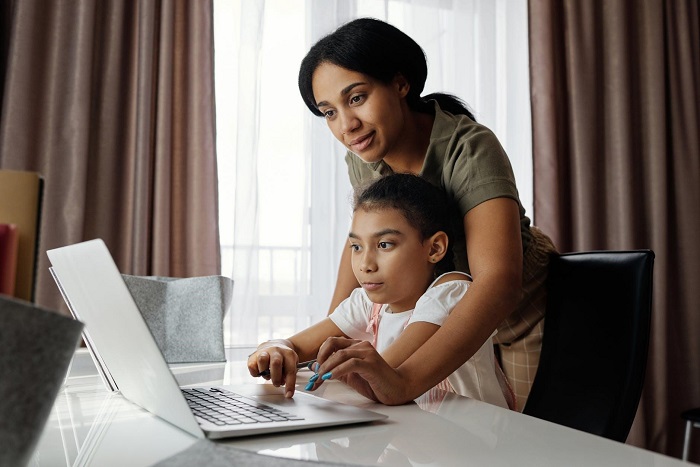The Challenges Parents Homeschooling their Children Face

The pandemic has made homeschooling a fact of life. Even before this, what was once the obscure choice of a few families has grown in popularity over the past decade. It may be the fastest-growing form of education around the world.
In the US today, there are an estimated 4 to 5 million homeschool students in grades K-12 (or 7% to 9% of school-age children). There were about 2.5 million homeschool students in the United States in spring 2019 (or 3% to 4% of school-age children), according to research from the National Home Education Research Institute.
Homeschooling children is a big decision parents make for diverse reasons. One of those reasons may be because some studies show that homeschooled kids score better at tests, particularly where those children had been homeschooled right through to high school level. They also tend to be more independent in their approach to life and learning, never feeling the need to follow the crowd, which serves them really well.
Other reasons may be because being educated at home removes a lot of the stress of the normal classroom. There is no pressure on kids to ‘fit in’ and give into peer pressure, or be exposed to and suffer cases of bullying, being ostracized, drugs, and other social pressures.
That said, some people think homeschooling is a simple and easier educational route for kids. However, parents who have chosen to homeschool their own kids would beg to differ.
Homeschooling is inherently different from traditional schooling and so it presents some unique challenges too. It should never be underestimated. The educational goals may be similar with traditional schooling, but the setting and methods are entirely different. Parents who themselves have gone through traditional schooling can attest to that.
If you are considering homeschooling your own kid(s), then you should be familiar with the biggest challenges and struggles that go along with this form of education.
Realities and Struggles of Homeschooling
Below we’ll highlight five distinct challenges and struggles homeschooling parents face you should know about to prepare adequately to homeschool your child, or to inform your decision if you are considering going this educational route:

1. It’s totally hands-on, which can take up all of your time
When you are a parent and you decide to homeschool your child, you take on the responsibility of teaching your child within the comforts of your own home.
Unless there is someone else in the family or in the house who can do the educating part in your position, you really have to allot and dedicate all your time to help your kids learn adequately. That can be a good thing or not, depending on your situation as a parent.
You must develop lesson plans, create a schedule for teaching, produce tests and devise learning activities, and more. Homeschooling is another designation for parents aside from being parents alone. It requires a great deal of time, dedication, effort, and knowledge, so that the child acquires quality education.
For working parents and single parents, all this may be very hard because, besides their parental duties, they have to be teachers too. It sounds (and actually is) arduous indeed. This is the reality of homeschooling that you should know before following this path.
2. It requires extra, extra patience
No kidding, homeschooling demands bags of extra patience from parents. You may add another extra if that's not enough.
One of the hardest parts about being a homeschooling parent is the reality that your patience will be greatly tested and even shaken when teaching your kids.
Whenever the kids do not grasp or understand lessons, even after multiple attempts at simple explanations, your patience will be tested. There will be days when the kids are distracted by something and not concentrating and it will drive you nuts.
And when their performance drops or is poor, some parents can get really frustrated.
Sometimes, a parent’s expectations may be beyond their children's current abilities, and so when not met, parents get really down in spirits. This can affect the whole learning process as both the parent and the child's mood and motivation can be seriously dented.
The big struggle here is drawing the line between being a parent and being an educator, which is difficult to keep tabs on for both the parent and their kids.
3. It’s generally more expensive than traditional schooling
Traditional public schools are typically cheaper than homeschool. You could spend $1,000 or more on a homeschool curriculum alone, not to mention supplies.
For a public school, you have to buy supplies once or twice a year and you can pack your child's lunch to save money. Some public schools even offer free education to students, with only some miscellaneous fees to be covered by parents.
Private schools may be costlier than public institutions, but that’s accounted for by the first-rate facilities and educational materials that are usually provided. And even traditional private schools may be cheaper in the long run than homeschooling.
Some parents who homeschool their kids make the mistake of overlooking this aspect of cost. As a homeschooling parent, you should know that you will generally have to pay more for homeschooling than for traditional schooling. Why and how?
Homeschooling parents have to procure the updated curriculum for their kids to not lose track of their level of required learning. Teaching apparatuses, equipment, and facilities can also be costly, especially because they are purchasing them individually unlike when a school buys them in bulk.
Beyond the basics for kids’ learning, like books, notebooks, and writing materials, there are more stuff for teaching that can demand a bigger budget than in other forms of education.
Furthermore, some parents select paid homeschooling programs which are more expensive, especially when home tutors are hired as the education quality is sometimes thought better than nonpaid ones.
4. It’s hard to convince kids to enroll in a traditional school
Some parents may want to enroll their kids in traditional schools after a certain number of years of homeschooling them. They may have planned for it beforehand due to personal reasons, or they may just notice a need for an integrated approach in their children’s education that they feel only traditional schooling can provide.
Now, when this happens, it’s not going to be easy to do.
There are two common responses from kids in this scenario. It’s either they are excited to enter actual school rooms because that’s a fresh experience for them, or they are nervous and afraid of it all, so they ask to remain homeschooled. The latter is where the headache comes in for parents. It can lead to arguments between parents and children.
If you experience this problem, consider taking it little by little and not immediately forcing your kids to go sit in a classroom with other students and with unfamiliar teachers. Slowly relinquish the role of personally teaching them might help. You may do that by enrolling them in an online solo class with an expert online instructor, then eventually into virtual group sessions, and finally transition them to a traditional school.
If your kids are finding some subjects like Science and Math difficult, for example, you can register them to an online Science and Maths tutoring services. This can help you naturally let them engage with other people, who are teachers and learning mates too, though not yet in face-to-face meetings. Eventually, they might find interest and courage to enter into a traditional school in the future.

5. It may force parents to be the ones looking for friends for their children
One of the best things in the lives of kids is having their classmates and friends with them in school. Their colleagues make the learning quest more colorful and enjoyable. This is where a major difference between traditional schooling and homeschooling comes to the fore.
Kids who are homeschooled are not learning together with other kids, particularly those of their age group. Typically, they study on their own at home with their parents or guardians. They can end up having less social exposure and interactions. As a result, many homeschoolers can suffer from a lack of social skills and are often afraid of meeting new people, new kids in their own age group, and cooperating in groups.
Homeschooled kids may tend to distance themselves from social activities and feel out of place easily. They may have no access to social interactions and contacts with peers like the ones formed in classrooms. Again, this is just for some kids and not for all. It does not apply to all homeschooling children, but this is common with them; it's something that can become a major setback not just for the kids, but also for the parents too.
As a homeschooling parent, this is a serious and sad matter that you should be fully aware of and do something about. Why? Because socializing and social interaction is very important for children's healthy development and general wellbeing.
Homeschooling can limit kids' opportunities to improve their interpersonal skills and abilities, especially if the parents do not do anything to help them socially. For parents who understand this danger of social interaction deprivation, they may take it upon themselves to personally look for friends for their children, which is challenging in itself.
As a parent who cares a lot about your children's social capacities and networks, you can intentionally let them meet other homeschooled kids and other kids outside the family who are a good influence. That is something that can have a lasting positive impact on your kids.
In conclusion
Homeschooling is challenging, as you can now tell. But homeschooling can also be very fulfilling for both parents and their kids. It may not be for all parents, of course, but it has its place in society and may even be necessary in some cases.
With adequate planning and preparation, you can truly give your child the best homeschooled education and see the sweet fruits of it all in your children's lives.





![How to Detect Lying Clients by Reading their Facial Cues [INFOGRAPHIC] How to Detect Lying Clients by Reading their Facial Cues [INFOGRAPHIC]](/sites/default/files/styles/thumbnail_rectangle/public/detect-lying-client.jpg?itok=TcH1jmhd)
















